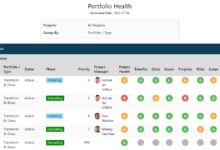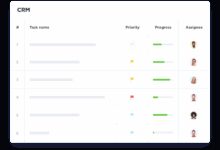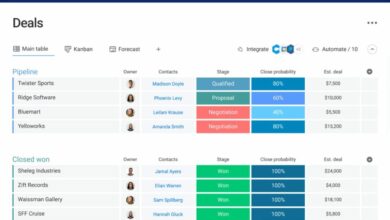Zoho CRM vs Salesforce: 7 Shocking Truths Revealed
Choosing between Zoho CRM and Salesforce can feel like picking between a nimble startup and a corporate giant. Both promise powerful tools, but which one truly delivers for your business? Let’s break it down—without the fluff.
Zoho CRM vs Salesforce: Market Position and Company Background

Understanding the roots of Zoho CRM and Salesforce helps explain their design philosophies, pricing models, and target audiences. While both are leaders in the CRM space, their origins and trajectories are vastly different.
Origins and Evolution of Zoho CRM
Zoho Corporation, founded in 1996 as AdventNet, began as a network management software provider. It rebranded to Zoho in 2005 and launched Zoho CRM in 1999—making it one of the earliest cloud-based CRM platforms. Unlike Salesforce, Zoho grew quietly, focusing on affordability, integration, and serving small to mid-sized businesses (SMBs).
- Zoho CRM started as a simple contact management tool and evolved into a full-stack CRM with AI, automation, and multi-channel support.
- The company is privately held, allowing it to prioritize long-term product development over shareholder pressure.
- Zoho offers over 50 integrated business applications, from Mail to Books, creating a self-contained ecosystem.
This ecosystem approach makes Zoho CRM a natural fit for businesses already using Zoho products or seeking an all-in-one suite without vendor sprawl.
Origins and Evolution of Salesforce
Salesforce, founded in 1999 by former Oracle executive Marc Benioff, is widely credited with pioneering the Software-as-a-Service (SaaS) model. Its mission was to eliminate the need for on-premise software by delivering CRM via the cloud.
- Salesforce launched with a bold promise: “The End of Software.” It disrupted the enterprise software market by offering subscription-based CRM.
- It went public in 2004 and has since acquired over 70 companies, including Tableau, Slack, and MuleSoft, expanding its capabilities far beyond CRM.
- Salesforce now dominates the global CRM market with a 19.8% share, according to IDC.
Salesforce’s aggressive innovation and ecosystem—powered by its AppExchange marketplace—make it a go-to for large enterprises needing deep customization and third-party integrations.
zoho crm vs salesforce – Zoho crm vs salesforce menjadi aspek penting yang dibahas di sini.
“Salesforce didn’t just enter the CRM market—they invented the cloud CRM category.” — Marc Benioff, Founder & CEO
Zoho CRM vs Salesforce: Pricing and Affordability
One of the most critical differentiators in the Zoho CRM vs Salesforce debate is pricing. For many businesses, especially SMBs, cost isn’t just a factor—it’s the deciding factor.
Zoho CRM Pricing Structure
Zoho CRM is renowned for its affordability. It offers a free tier for up to 3 users, making it one of the few CRMs that allow small teams to get started at zero cost.
- Free Edition: Includes basic CRM features like contact management, lead tracking, and email integration.
- Standard ($14/user/month): Adds automation, webforms, and social media integration.
- Professional ($23/user/month): Includes custom functions, territory management, and advanced automation.
- Enterprise ($40/user/month): Offers advanced analytics, audit trails, and role-based layouts.
- Ultimate ($52/user/month): Includes all features plus forecasting, real-time analytics, and multi-currency support.
Zoho also offers bundled pricing through its Zoho One suite ($40/user/month), which includes 45+ Zoho apps—ideal for businesses wanting an all-in-one solution.
Salesforce Pricing Structure
Salesforce is significantly more expensive, reflecting its enterprise focus. It doesn’t offer a free tier, and pricing is often opaque, requiring direct consultation for quotes.
- Salesforce Essentials ($25/user/month): Entry-level CRM for small businesses with basic sales automation.
- Sales Cloud Professional ($75/user/month): Includes workflow automation, email integration, and reporting.
- Sales Cloud Enterprise ($150/user/month): Offers full customization, API access, and advanced analytics.
- Sales Cloud Unlimited ($300/user/month): Includes 24/7 support, sandbox environments, and premium features.
Additional costs often arise from add-ons like Communities, Pardot (marketing automation), and Service Cloud, pushing total costs much higher.
“Zoho CRM delivers 80% of Salesforce’s functionality at 20% of the cost for most SMBs.” — Gartner Peer Insights
Zoho CRM vs Salesforce: Feature Comparison
When comparing Zoho CRM vs Salesforce, feature depth and usability are paramount. Both platforms offer robust tools, but their approach to functionality differs significantly.
zoho crm vs salesforce – Zoho crm vs salesforce menjadi aspek penting yang dibahas di sini.
Sales Automation and Lead Management
Both platforms excel in sales automation, but with different philosophies.
- Zoho CRM offers intuitive, drag-and-drop automation builder (Zoho Flow integration), lead scoring, and round-robin assignment. Its AI assistant, Zia, provides predictive insights and automates follow-ups.
- Salesforce uses Process Builder and Flow for automation, which are powerful but require technical expertise. Einstein AI offers forecasting and lead prioritization.
For non-technical users, Zoho CRM’s automation is more accessible. Salesforce offers deeper customization but at the cost of complexity.
Marketing and Campaign Management
Marketing integration is crucial for end-to-end customer journey tracking.
- Zoho CRM integrates seamlessly with Zoho Campaigns, allowing email marketing, A/B testing, and campaign analytics within the same ecosystem.
- Salesforce pairs with Pardot, a robust marketing automation tool, but it’s sold separately and starts at $1,250/month—making it cost-prohibitive for many SMBs.
Zoho provides a more affordable, integrated marketing solution, while Salesforce offers enterprise-grade power at a premium.
Customer Service and Support Tools
Both platforms extend beyond sales into customer service.
- Zoho CRM integrates with Zoho Desk and Cliq (messaging), enabling support ticketing, SLA management, and team collaboration.
- Salesforce offers Service Cloud, a comprehensive support platform with omnichannel routing, knowledge base, and AI-powered chatbots.
Service Cloud is more feature-rich, but Zoho Desk provides excellent value for smaller teams needing basic support functionality.
zoho crm vs salesforce – Zoho crm vs salesforce menjadi aspek penting yang dibahas di sini.
Zoho CRM vs Salesforce: User Experience and Interface
A CRM is only as good as its usability. Even the most powerful platform fails if users avoid it due to complexity.
Zoho CRM boasts a clean, modern interface with a left-hand navigation panel, customizable dashboards, and role-based views.
- Users praise its intuitive layout and minimal learning curve.
- Drag-and-drop customization allows non-developers to modify layouts and workflows.
- The mobile app is highly rated, offering offline access and voice commands via Zia.
In contrast, Salesforce has a steeper learning curve. Its interface, while powerful, can feel cluttered to new users.
- The Lightning Experience redesign improved usability, but navigation remains complex.
- Customization often requires admin training or developer support.
- Mobile app is robust but less intuitive than Zoho’s.
Customization and Flexibility
Customization is where Salesforce traditionally shines.
- Salesforce allows deep customization via Apex (its programming language), Visualforce pages, and Lightning Web Components. Admins can build custom apps, workflows, and UI elements.
- Zoho CRM offers extensive customization through its Blueprint tool, custom functions, and integration with Zoho Creator for low-code app development.
While Salesforce wins in raw flexibility, Zoho CRM provides sufficient customization for most SMBs without requiring coding skills.
“Salesforce is like a Ferrari—powerful but needs a skilled driver. Zoho CRM is like a Tesla—smart, intuitive, and ready to go.” — TechRadar CRM Review
Zoho CRM vs Salesforce: Integration and Ecosystem
No CRM operates in isolation. Integration with email, calendars, marketing tools, and ERP systems is essential.
zoho crm vs salesforce – Zoho crm vs salesforce menjadi aspek penting yang dibahas di sini.
Native Integrations and App Marketplaces
Zoho CRM integrates natively with over 40 Zoho apps, including Mail, Books, Projects, and Survey. This creates a seamless workflow for businesses using multiple Zoho products.
- Zoho Marketplace offers 750+ third-party integrations, including Gmail, Outlook, Shopify, and QuickBooks.
- Zoho Flow enables automated workflows across apps without coding.
Salesforce’s AppExchange is the largest CRM marketplace, with over 5,000 apps.
- Popular integrations include Mailchimp, DocuSign, Zoom, and SAP.
- Integration requires more setup and often additional costs.
For businesses already in the Zoho ecosystem, integration is frictionless. Salesforce offers broader third-party support but at higher complexity and cost.
API Access and Developer Tools
For businesses needing custom integrations, API access is critical.
- Zoho CRM provides REST APIs, webhooks, and SDKs for Java, .NET, and Python. API rate limits vary by edition.
- Salesforce offers robust APIs (REST, SOAP, Bulk) and a mature development environment with Salesforce DX, Heroku, and Trailhead learning platform.
Salesforce is the clear winner for enterprises with in-house developers. Zoho CRM provides adequate API access for most integration needs.
Zoho CRM vs Salesforce: AI and Automation Capabilities
AI is transforming CRM by enabling predictive analytics, chatbots, and automated workflows.
zoho crm vs salesforce – Zoho crm vs salesforce menjadi aspek penting yang dibahas di sini.
Zia: Zoho’s AI Assistant
Zia is Zoho CRM’s AI engine, designed to assist sales teams with intelligent insights.
- Features include voice commands (“Call John now”), email sentiment analysis, and predictive lead scoring.
- Zia can auto-schedule follow-ups, detect deal risks, and suggest next best actions.
- Available in Professional edition and above.
Zia is user-friendly and requires minimal setup, making AI accessible to non-technical teams.
Einstein AI: Salesforce’s Intelligent Engine
Salesforce Einstein is a suite of AI capabilities embedded across its products.
- Einstein Lead Scoring ranks leads based on historical data.
- Einstein Opportunity Insights predicts deal closure and identifies risks.
- Einstein Bots automate customer service interactions.
- Einstein Analytics provides natural language querying and dashboards.
Einstein requires more configuration and data volume to be effective. It’s powerful but often underutilized due to complexity.
“Einstein is like a PhD in AI, while Zia is your smart assistant who gets things done fast.” — CRM Magazine
Zoho CRM vs Salesforce: Deployment, Support, and Scalability
How a CRM is deployed, supported, and scaled impacts long-term success.
Deployment Options and Setup Time
Zoho CRM is 100% cloud-based with a quick setup process.
zoho crm vs salesforce – Zoho crm vs salesforce menjadi aspek penting yang dibahas di sini.
- New users can be onboarded in under an hour.
- Free training webinars, knowledge base, and community forums are available.
- Professional services are offered for complex migrations.
Salesforce also offers cloud deployment but with longer setup times.
- Implementation can take weeks or months for large organizations.
- Requires admin training or hiring a Salesforce consultant.
- Trailhead provides free learning modules, but mastery takes time.
Customer Support and Community
Support quality can make or break a CRM experience.
- Zoho CRM offers 24/5 email and phone support on paid plans. Response times are typically under 24 hours. Its community forum is active and helpful.
- Salesforce provides 24/7 support on Enterprise and Unlimited editions. Lower tiers have limited support hours. The Salesforce Community is massive, with over 2 million members sharing solutions.
Salesforce has a stronger support ecosystem, but Zoho’s support is sufficient for most SMBs.
Scalability for Growing Businesses
Both platforms scale, but differently.
- Zoho CRM scales well from 5 to 500 users. Its modular pricing allows adding features as needed. Zoho One is ideal for companies wanting to scale across multiple business functions.
- Salesforce is built for enterprise-scale operations, handling thousands of users and complex global workflows. Its multi-currency, multi-language, and compliance features support international expansion.
For startups and mid-market companies, Zoho CRM offers smoother scaling. Enterprises with complex needs will lean toward Salesforce.
Zoho CRM vs Salesforce: Security and Compliance
Data security is non-negotiable in CRM selection.
zoho crm vs salesforce – Zoho crm vs salesforce menjadi aspek penting yang dibahas di sini.
Data Encryption and Access Controls
Both platforms offer enterprise-grade security.
- Zoho CRM uses AES-256 encryption, two-factor authentication, and role-based access control. It complies with GDPR, HIPAA, and SOC 2.
- Salesforce also uses AES-256 encryption, IP restrictions, and field-level security. It meets GDPR, HIPAA, SOC 1/2/3, and ISO 27001 standards.
Salesforce has a slight edge in compliance breadth, making it preferable for regulated industries like finance and healthcare.
Compliance and Certifications
Compliance is critical for global businesses.
- Zoho is certified for GDPR, HIPAA, and SOC 2, suitable for most industries.
- Salesforce holds additional certifications like FedRAMP (U.S. government), PCI DSS (payment processing), and ISO 27001, making it ideal for highly regulated sectors.
If your business operates in a regulated industry, Salesforce’s compliance portfolio may be a deciding factor.
“Security isn’t a feature—it’s a foundation. Both Zoho and Salesforce build on solid ground.” — CIO.com
Zoho CRM vs Salesforce: Real-World Use Cases and Customer Feedback
What do actual users say? Let’s examine real-world scenarios.
SMBs and Startups: Why Zoho Wins
Small businesses praise Zoho CRM for its affordability and ease of use.
zoho crm vs salesforce – Zoho crm vs salesforce menjadi aspek penting yang dibahas di sini.
- A 10-person marketing agency reported cutting CRM costs by 70% switching from Salesforce to Zoho.
- Many startups appreciate the free tier and seamless integration with Zoho Mail and Projects.
- Users highlight Zia’s AI features as surprisingly effective for small teams.
Zoho CRM is ideal for businesses that need a capable CRM without the enterprise price tag.
Enterprises and Large Organizations: Why Salesforce Dominates
Large companies rely on Salesforce for its scalability and ecosystem.
- A Fortune 500 company uses Salesforce to manage 10,000+ sales reps across 30 countries.
- Integration with Slack and Tableau enables real-time collaboration and analytics.
- Custom apps built on Salesforce Platform support unique business processes.
Salesforce’s ability to handle complexity and scale globally makes it the enterprise standard.
Zoho CRM vs Salesforce: Final Verdict and Recommendations
So, who wins in the Zoho CRM vs Salesforce battle? The answer depends on your business size, budget, and needs.
- Choose Zoho CRM if: You’re an SMB, startup, or mid-market company looking for an affordable, easy-to-use CRM with strong automation and AI. Ideal for businesses already using Zoho apps.
- Choose Salesforce if: You’re a large enterprise needing deep customization, extensive integrations, and global scalability. Worth the investment if you have the budget and technical resources.
There’s no one-size-fits-all answer. But for most small to mid-sized businesses, Zoho CRM offers the best balance of power and price.
Is Zoho CRM better than Salesforce?
zoho crm vs salesforce – Zoho crm vs salesforce menjadi aspek penting yang dibahas di sini.
Not universally. Zoho CRM is better for small to mid-sized businesses due to its affordability, ease of use, and integrated ecosystem. Salesforce is superior for large enterprises needing advanced customization, scalability, and third-party integrations.
Can Zoho CRM replace Salesforce?
Yes, for many SMBs. Companies with simpler sales processes, limited budgets, and no need for deep technical customization can successfully replace Salesforce with Zoho CRM. However, enterprises with complex workflows and extensive integrations may find Zoho lacking in certain areas.
Which CRM has better AI?
Salesforce Einstein offers more advanced AI capabilities, but it requires more setup and data. Zoho Zia is more accessible and user-friendly, delivering practical AI features out of the box. For most teams, Zia provides sufficient intelligence without the learning curve.
Is Zoho CRM worth it for small businesses?
zoho crm vs salesforce – Zoho crm vs salesforce menjadi aspek penting yang dibahas di sini.
Absolutely. With a free tier, low-cost plans, and powerful features like automation and AI, Zoho CRM is one of the most cost-effective CRMs for small businesses. Its ease of use ensures high user adoption, which is critical for CRM success.
Does Salesforce offer a free CRM?
No, Salesforce does not offer a free CRM. The cheapest plan, Salesforce Essentials, starts at $25/user/month. Some limited-time trials are available, but there’s no permanent free tier like Zoho CRM.
In the Zoho CRM vs Salesforce showdown, both platforms excel in different arenas. Zoho CRM wins on affordability, simplicity, and value for SMBs. Salesforce dominates in enterprise power, customization, and ecosystem depth. Your choice should align with your business size, budget, and long-term goals. Evaluate your needs, take advantage of free trials, and choose the CRM that fits—not the one with the biggest name.
zoho crm vs salesforce – Zoho crm vs salesforce menjadi aspek penting yang dibahas di sini.
Further Reading:






